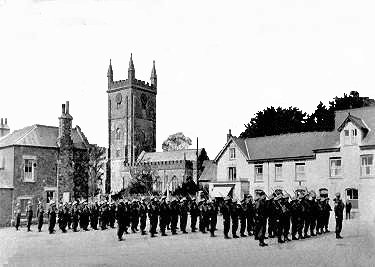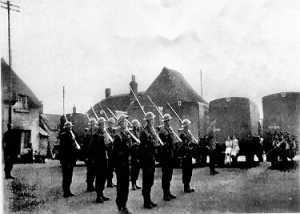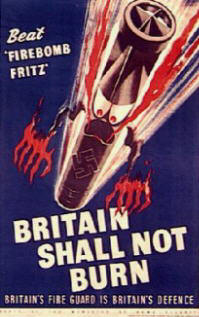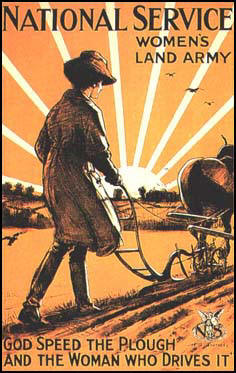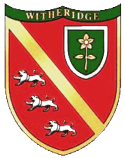

|
(EW) The Manchester's came to the village soon after Dunkirk, and the men were billeted in the chapel schoolroom, whilst the officers were billeted about the village. The troop's cookhouse was in the Angel Yard, the Sergeants Mess in the Mitre, and the Officers Mess in the Hare and Hounds, with drill taking place on the Square. The coming of the Manchester's made the village's usual water shortage worse; they used to import their own by tanker, and share it round. The tanker became known as 'Gunga Din'. E.W. was secretary of the WVS. and they ran a canteen in the church room. There was no water laid on there and no kitchen as such. Water had to be carried in from the tap at the side of the Pound House. The two primus stoves needed oil and methalated spirits. There was no sink at the church room and the slops were thrown down a drain through a grating at the back of the room. Games, draughts, Picture Post and other papers were provided and the WVS. spent £8 for a wireless for the canteen. At 10.30 in the morning all officers, NCOs and men came in for tea, and whatever could be scrounged to eat. In the evening, only the men came. The WVS. used to sew on their stripes and badges and darn their socks. There was some criticism, some said, "They only want to help in the canteen to be with the men." There were concerts and dances. Two local girls married Manchester's. As far a crime was concerned, (EW) recalls only one instance when a soldier broke into the bedroom of a local girl, who happened to be treasurer of a local club, to steal the funds from under the bed. So difficult were things for the army after Dunkirk that on one occasion there was no money to pay the troops, and a local man put up a loan of £300 to pay the officers and men their overdue wages. When the Manchester's came to Witheridge, they thought it was a terrible place. They eventually came to like it. Geoffrey Weymont was billeted with Alan Vernon's family. When Geoffrey lost his leg he took Holy Orders and his ambition was to be Vicar of Witheridge. He actually became Vicar of Romansleigh, and his first task there was to bury Alan's father, his greatest friend.
The Manchester's were followed by the RASC. and the RAMC. who parked their ambulances in The Square camouflaged against the German bombers on their run to Cardiff or Swansea. Next came the Royal Artillery who also suffered from the water shortage. "Mother said what's the good of sending troops here, the isn't enough water for the rest of us." (CG) says that water for the troops was bought in by lorry. "They'd commandeer anything, fields, what they wanted." "Once there was an alarm in the middle of the night and all the troops turned out and stayed there for hours waiting, but it was a false alarm." "The soldiers used to stand outside the chapel looking, people were sorry for them." (CG) says that the Women's Institute split in two, one half did coffee for the troops and the other half did not." There were American troops encamped at Deer Park Cross, Cruwys Morchard, for a time. They patronised the Angel, "beer in one hand and whisky in the other", and the Hedgebanks between Witheridge and Cruwys Morchard were said to be littered with their beer bottles. These premises were the only ones in Witheridge to suffer damage in the Second World War, and not from enemy action but from our American allies. Before the invasion of Europe in 1944, American tank forces used to carry out manoeuvres on Exmoor, and, one day, a loaded tank transporter came up through the village from South Molton. It had already had a brush with the surroundings, for there were telephone wires draped round its Grant tank. Unfortunately, it got wedged where the road narrowed by Greenslade's shop with its hubs touching the buildings on both sides of the road. The driver revved up, and the transporter moved forward taking a corner of the shop with it, and leaving the bed upstairs hanging out over the street. The American comment was," What are these 'goddam' houses made of, paper?". The walls were rebuilt, but a few weeks later another transporter arrived and this time most of the village went to watch it knock the shop down for the second time, which it duly did. The Americans patronised The Angel "beer in one hand and whiskey in the other" and the hedgebanks between Witheridge and Cruwys Morchard were said to be littered with their beer bottles. One evening, (EW)'s husband went into The Angel and he was told he was late. He inferred that the Americans custom was preferred to his so he walked out and did not use The Angel again for some time. (EW) cannot recall any village girls who married Americans.
Bombs and Planes: E.W. recalls only 3 or 4 bombs in a field down towards Worlington. One German plane came down near Black Dog after a dogfight. Crowds had stood watching and drove out to see it. E.W. remembers no plane coming down at Bradford. The Home Guard were turned out to guard a plane down at Middlewick. A Spitfire came down at Black Dog after a dog fight. The Czech pilot landed safely. "The German pilot circled round and never fired at him." The searchlight crew were forbidden to fire at the German with their machine gun. C.G remembers sleeping in the back bedroom at Fern Cottage one night when a plane came down in Bradford Pond and blew up so hard that "the bed shook." When they bombed Exeter so badly you could see the flames in the sky from here. A German plane came down near Gidley Cross; one pilot walked to a nearby farm where they gave him breakfast; the other was dead and lay in the field." The nearest bombs were recalled as being Crediton and Shobrooke. When Exeter was bombed, the glow in the sky could be clearly seen. (JK) recalls the time when "Six Whiteleys came over at 50ft, on their way to bomb the Eider Dam." F K was in the Fire Guard; they used to practice "down in Winston Maunder's field" under the command of Bill Vernon. There was a tin shed there and they used to pile in green grass and set fire to it and then crawl around, one behind the other in the smoke, to practice. (JK) was first into the Royal Observer Corps in Witheridge; he joined with Reg Rodd; their headquarters were Reg Rodd's chicken house, next to Merryside (after it had been deloused) before a proper shed had been built. It was manned 24 hours a day; full timers worked (4 hours on, eight off, four on, 12 off) 80 hours a week, and were paid £2.16.0. Names that (JK). recalls as being members included Fred and Sid Radford, Sid Dart, Frank Kingdom, Bill "Postman" Kingdom, Bill "Sideways" Kingdom, Bill Gold, Cyril Partridge. (JK). recalls the time when "Six Whiteleys came over at 50ft, on their way to bomb the Eider Dam." (JK). and (FK). had a garden down Coombe Road and one day (FK) left her 3 speed Hercules bicycle (costing £5.15.6) by some steps and it was run over by a quarry lorry of Nott's from Coombe Quarry. It took a long time to find out who had done it (George Shaw was the driver); she had to send the broken wheel away to the insurance company for them to see before they would pay up on her claim. Twins Roy and Len Tidball were born at Witheridge on 29 May 1921. They both belonged to the Royal Air Force Volunteer Reserve. Both joined Bomber Command. Leonard died 8th Nov. 1942. Roy died 26th July 1943. Evacuees: (WV). was in charge of evacuees and "arranged them all, and paid their allowances." (OV) and (WV) had "a girl from London, covered in impetigo and took her to Tiverton and rigged her out at their own expense." About June 1940 came the evacuees from Erith and Belvedere with their teachers. E.W. recalls that "it was poor stuff they had" and little they got from their parents. The village kitted them up and helped to supplement the 8/6d per week their hosts were paid. E.W. had two Belvedere boys for a year and then a rough lot from Bristol came. Overall, they didn't give much trouble. E.W. believes that the three, Tommy Green (now of Butt's Close), Walter Green and Ivan Spedutti, were on farms and stayed on after leaving school. "When they came from Woolwich we all went up the Higher School to receive them; they were all frightened with things around their necks - 'there's two boys for you and one for you. They are said to have settled in well. Some couldn't use a knife and fork "there was a big girl from Bristol who didn't stay long." The country did not feel the rationing much, but the blackout and clothes rationing struck home." Food got scarce and we used to barter a lot." Leonard used to carry about a piece of something or other broken in his car in case he was stopped. (Petrol rationing) In Essex, the Policeman used to come for eggs and put them up in his hat. I went up Essex and the bombs started falling so I came home, it was safer here than anywhere else. There was a New Year's Whist Drive and Dance, along with a Fancy Dress Parade, always arranged by the Conservative Local Branch. The charge was 1/6d, and two pence extra for entering the balloon dance. In 1940, for example, the Angel Room cost £1-15-0 and the band £3, as is shown in the Treasurer's account book of the "Women's Unionist Society." As is usual in these accounts that for 1940 shows 3/- for "Ball Room Powder", reflecting the condition of the Angel floor. Laundry and oil (paraffin) cost 1/6. In 1940, the summer outing (this time to Ilfracombe, fare 5/-, members 2/6) still took place, but the war is noted by a donation in February of £10 to Lady Amory for Red Cross Funds. In 1941, donations of £6 to "Auxiliary Hospitals" and £2-5-0 to War Weapons Week were recorded. In 1942, £5 to Red Cross in 1943, £3-0-6 1/2 to Mrs Churchill's Aid to Russia Fund, and £5 to the Duke of Gloucester's Red Cross. In 1944, £8 to the Red Cross, in 1945, £18-6-6 to the Nursing Association, and in 1946, £8 to Earl Haig's fund. Italian Prisoners: There were some on the farms. War Work: I was directed to do something of good. My sister-in-law in North Tawton had a young child and was expecting another so I went and looked after the child. I let my house. I was sent for to interview me to know what I was doing, so I went and said I was doing poultry and looking after the child: I told them nothing about the farm although they asked me - I was as good as they were.
Threshing: (AB) In the Second World War, threshing teams were allocated areas. Charlie Singleton wasn't pleased with his allocated area, as he wouldn't be doing so well threshing corn from poor ground round Knowstone and Rackenford, so he went back to his own area and threshed. The War Ag. pulled him up and told him off. His reply to them was "I used to think you chaps was a fine lot of fellows but now I know that you're a silly lot of buggers." Searchlights: (AB) There was one search light out at Venhay, another sited halfway between Westway Cross and Millbran Cross, with a hut that the team of eight or nine lived in and where they cooked for themselves. They were "handy chaps to have about, especially at harvest time. They were here most of the war and became like local people." Salvage: (EW) Mrs Bert Cox, Mrs Hooper, Mrs L. Baker, Mrs Mann, Mrs Jim Leach and E.W. (as secretary of the WRVS.) used to collect salvage. Rolf Tarr lent his linhay at Cross Park for sorting and storage of salvage, flattening cardboard and shredding string to make it go further. Extra clothing coupons were applied for to purchase overalls for this work, but they were refused, this caused indignation. Scrap: C.G remembers that all the railings went for scrap except hers and those along the churchyard. To mark the first anniversary of the coming to Witheridge of evacuee children, the two Witheridge schools combined to hold a successful sports day on Friday week. Senior and junior events were held in a field lent by Mr S Selley, while infants enjoyed games in one of the playgrounds. More than 300 children contested the several events. For the older children Mr L Ollerenshaw (headmaster of the Council school) was starter. He was assisted by Mr Gates and Miss Rowland. Mr J H Dryer (headmaster of the Church Council), Mrs Churchill and Mr Thomas combined the duties of ushers and judges. The infants were under the charge of the Misses Hall, Alford and Howells. The afternoon ended with a display of folk dancing by senior boys and girls of both schools, in the last of which (Circassian Circle) many spectators accepted the invitation to join. SOUTH MOLTON GAZETTE 31st August 1945: Witheridge was gaily bedecked with flags for VJ Day. A United Service was held in the Square. Fireworks were discharged and sumptuous teas were provided. Sports were held in a field kindly lent by Mr A Tucker. A dance raised £8 for the Welcome Home Fund. For the free Victory tea for the whole parish all provisions were given. The profit on the two days events was £55 5s 7d. Previous Last Edited 03/07/2006 Copyright © 2000-2006 Witheridge Unless otherwise indicated on the page in question, the photographic images reproduced on this site belong to the Witheridge Archives, and, as such may not be reproduced for commercial purposes without written permission. However, you are welcome to use any of the photographs belonging to the archive for personal and/or non-commercial use. Any material shown as not being owned by the archive may not be reproduced in any form without first receiving written permission from the owner of the material in question. |


